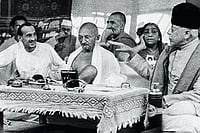He could light a pipe with élan and work all night on his budget speech. With much the same enthusiasm and ease he could chant Durga Stuti during Durga Puja in his remote village in Birbhum in West Bengal.
I was staying in North Avenue, close to his official residence in Talkatora Road in Delhi. We would exchange greetings on morning walks. So, it was easy for him to recollect my early morning meetings when I sought an appointment with him as Foreign Minister sometime in 2008 or early 2009.
One of my visits to Colombo was at a time when the dreaded LTTE was still strong and challenging the military might of the government forces. The Rajapaksa government had won the mandate in 2005 and resolved to finish off the Tigers. Colombo had turned the tide of the war and the LTTE was on the back foot. The latter must have decided to play its usual trick of seeking a ceasefire, showing willingness to hold talks. Their contacts in Tamil Nadu had approached New Delhi even as our agencies were keeping a watch. The LTTE’s strategy was to get hostilities stopped and use the ceasefire to regroup and acquire more fire power.
However, this time Colombo decided not to succumb to the ceasefire game plan. But their strategic war room was apprehensive of New Delhi, as they were informed that Indian Foreign Minister Pranab Mukherjee would visit Colombo to suggest a ceasefire. I was told about this by a high-ranking official of the strategy group. Their plea was that Pranabda should not visit Colombo, and not press for ceasefire. The question was, who will tell him? Needless to say, I did not opt to be a messenger.
Yet, when I returned to Delhi I sought a meeting with Pranabda and told him of Colombo’s request. He was furious. “Who are they to tell me not to go to Colombo,” he roared. I was terrified and felt miserable sitting in front of him. But quickly his demeanour changed and he offered me tea. I gulped it down in one go and was happy to run out of the room. Back in office I conveyed to Colombo to be prepared for a shock and a ceasefire. As time passed I got a call from a senior politician, thanking me for convincing the foreign minister to cancel his visit. Much later, I came to know that he had held detailed consultations with a number of people and decided to ‘wait and watch’.
In fact, defying ‘advice’ from his friends in the Congress he went to the RSS office in Nagpur, addressed the gathering and spoke about India’s “perennial universalism of 1.3 billion people….living under one flag, with one identity of being ‘Bharatiya’ and have no enemies.’’ And this at a time when a Congress scion was censuring the RSS. It is sad that the some petty-minded Congress sycophants have faulted Pranabda’s visit to the RSS HQ on day when his mortal remains were being consigned to flames.
Pranabda was very good at being patient. He never reacted even at extreme provocations, a quality that few, like former prime minister and his best friend Atal Behari Vajpayee, had. When Jaswant Singh was made finance minister in 2002, I had reminded Vajpayee about his objection to making Pranab Mukherjee the finance minister (in 1982) as he was from Rajya Sabha. “Han, lekin woh achche vitta mantra nikle, yeh bhi aise hi honge (Yes, but he turned out to be a good finance minister, thus one too will be good),” Vajpayee quipped.
Pranabda was good at whatever he did. Even his rebellion within the Congress was in style. He was probably the best trouble-shooter of the Congress but also the pet bête noir of its first family. The present day rebels in the Congress could probably benefit immensely if they take some lessons from his life experiences. Alvida, Pranabda.
(The author is a politician and foreign policy analyst)
























